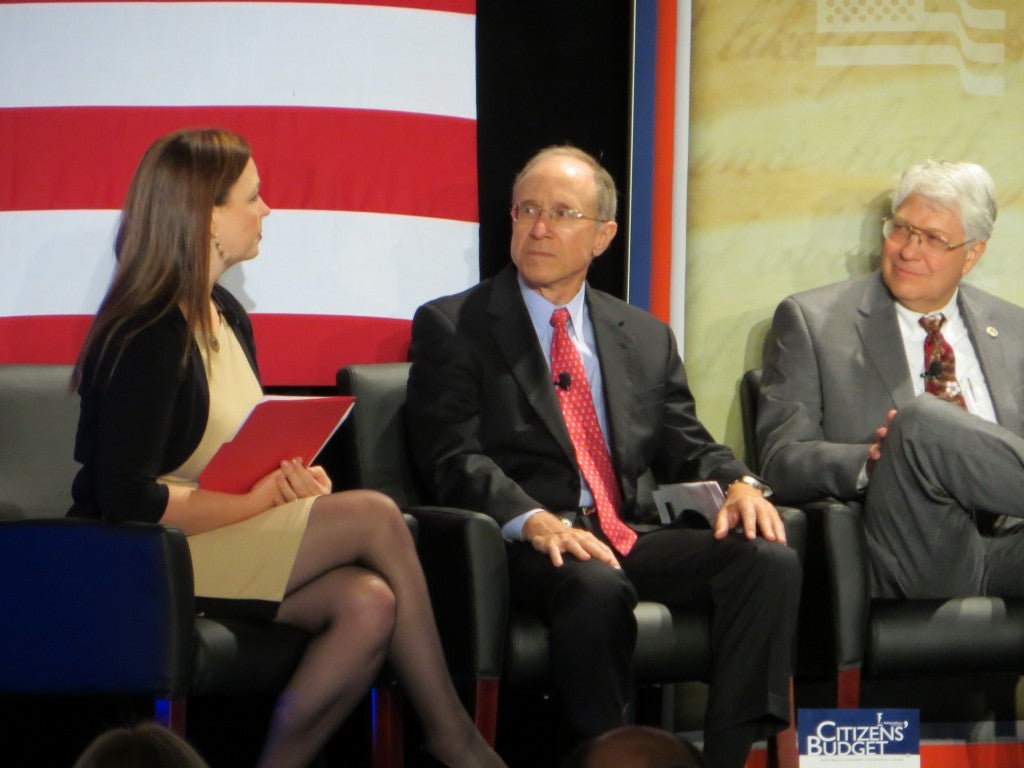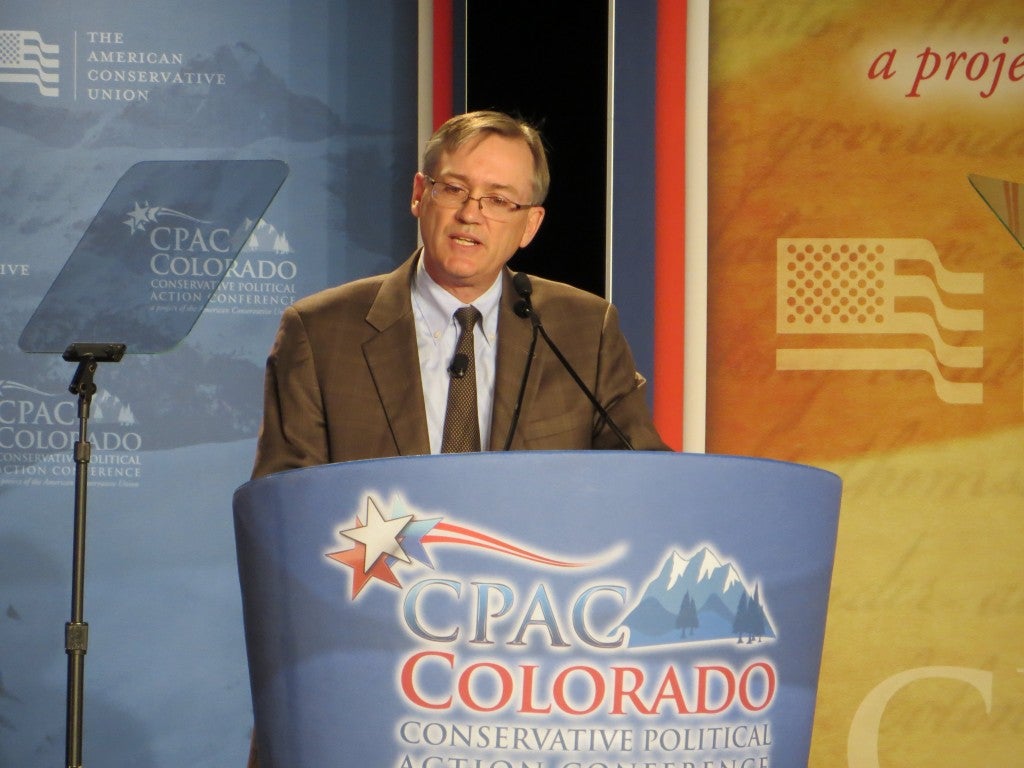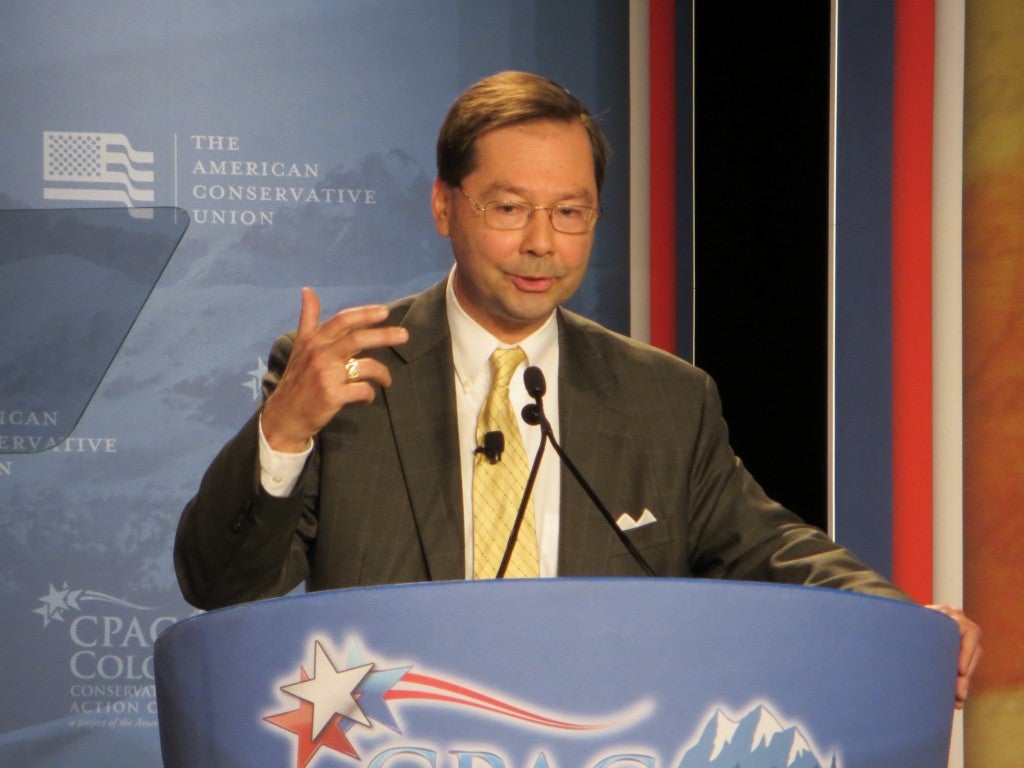DENVER — Members of The Heritage Foundation’s policy team joined experts from across the country at the Conservative Political Action Conference in Colorado. The event included a surprise visit from former Governor Mitt Romney and speeches by Senators Orrin Hatch (R-UT), Marco Rubio (R-FL) and John Thune (R-SD).
Heritage experts covered a range of topics, outlining policy solution on hot-button issues that included the fiscal crisis, energy and voter fraud. The following is a recap of the event:
Fiscal Crisis

(Bill Beach, center, photo by Michael Sandoval)
Heritage’s Bill Beach, director of the Center for Data Analysis, while speaking on the panel titled “Jobs in Jeopardy: Addressing America’s Fiscal Crisis,” stressed to attendees the solution for helping reverse the economic situation.
“How do economies cure themselves of recession? They create small businesses. Small businesses are created and that’s where the jobs are created,” Beach said.
Those thousands of small businesses have, since World War II, created millions of new jobs, according to Beach. But that’s not what the economy is witnessing this time around. For Beach, this recession has been unique in not creating the businesses that help create the jobs that spur economic growth and recovery.
Beach knows why.
“It’s not that hard. The cost of starting a small business is really high. The cost is high because of onerous new regulations that have been passed, because of record-spending tax increases which are coming in January,” he said.
The $494 billion tax increase, dubbed “Taxmageddon,” is a combination of expiring tax policies and the implementation new taxes associated with Obamacare.
“Now we are within months of a major financial crisis in the United States. No economy has grown at its optimum when the percentage of the debt relative to the economy has been above 70 percent,” Beach said.
The country currently sits at 73 percent publicly-held debt, with total debt exceeding 100 percent of GDP. And, according to Beach, that will only lead to fiscal crises.
Beach put the trillion in debt into perspective.
“One trillion seconds ago was 37,000 BC,” said Beach, who also pointed to NBA player LeBron James’ salary — $46 million per year — and concluded that it would take the basketball star approximately 38,000 years just to earn $1 trillion.
Energy

(Robert Gordon, photo by Michael Sandoval)
Robert Gordon, Heritage’s senior adviser for strategic outreach, tackled the problem of government intrusion in the energy market on a panel titled, “No More Solyndras: How the Big Gren Agenda Stands in the Way of Energy Independence.”
Gordon noted the barrage of negative environmental news that besiege Americans daily, creating a vicious cycle that reinforces even more calls for expensive but speculative environmental policies.
“Science can no longer be value-neutral when employed in policy arena to determine environmental policies,” said Gordon.
This has led to what Gordon describes as a push for “social transformation” in government policies.
“Government regulation and ownership, centralized and top-down, is necessary to protect Earth’s natural resources,” Gordon said of the push for policies in line with environmental goals.
“They [policies] are all wrong,” he argued.
“Most of our environmental policies are based upon wrong-headed world views like the one I just described. Bad ideas like these have consequences,” Gordon concluded.
In contrast, Gordon offered solutions from the American Conservation Ethic.
That ethic should be consistent with “individual liberty, limited government, and free markets,” said Gordon. Those principles need to be articulated through to policy solutions.
“People are the most important, unique, and precious resource,” Gordon said. “This is a recognition that human creativity is the most powerful force for improving our environment.”
“An environmental policy can not be good for the environment if it is bad for people.”
Voter Fraud

(Hans von Spakovsky, photo by Michael Sandoval)
Hans von Spakovsky, senior legal fellow at Heritage and a former member of the Federal Election Commission, weighed in on the panel titled, “Stealing Election: What the Left Doesn’t Want You to Know About Voter Fraud.” Spakovsky, along with John Fund, debunked myths surrounding voter fraud in the recent book, “Who’s Counting? How Fraudsters and Bureaucrats Put Your Vote at Risk.”
“Fraud has changed the outcome of elections,” Spakovsky said. His book highlights a number of voter fraud cases around the country in recent elections where fraud has occurred.
Spakovsky argues that any one of the examples in the book “demolishes this false narrative you hear from the Left and the media that ‘there is no voter fraud.'”
Spakovsky characterized their attitude.
“You don’t need to worry about it.”
Spakovsky disagreed.
“If you do a Google search, just in the past month, you’ll turn up case after case,” Spakovsky said, pointing to a case in Arkansas that was decided by just 8 votes.
Spakovsky argues for requiring voter ID and proof of citizenship to vote.
“What they [the Left] don’t want you to know is that the Justice Department, where I used to work, the Civil Rights Division, whose responsibility as a law enforcement agency is to enforce federal voting rights laws which protect Americans from discrimination in the voting process, to protect our military voters and guarantee their right to vote — that is supposed to be a non-partisan agency, one that protects all Americans,” Spakovsky said.
“The Civil Rights Division, these days, is the in-house lawyer or in-house counsel for the Obama reelection campaign,” he said. “They are partisan. They are not objective.”
Spakovsky detailed how the administration has failed to enforce voting laws.
“They want inaccurate voter rolls,” he said. Efforts at the state level have begun in earnest, according to Spakovsky, despite federal opposition.
Voter integrity is also a personal issue.
“I’m a first-generation American, you can tell by my name. Both my parents had experience growing up in dictatorships. There were two things I learned from them as a child. One, I was very lucky to be living in this great democracy. But two, democracies can be very fragile,” Spakovsky said.
“The key to maintain our democracy is eternal vigilance,” he concluded.































One Reply to “Conservatives Outline Policy Agenda Following Presidential Debate”